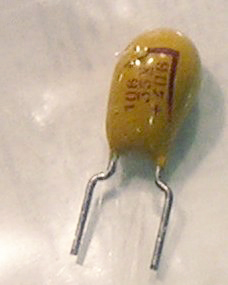Capacitance facts for kids
Capacitance is a cool idea in electricity. It's all about how much electric charge an object can hold. Think of it like a special container for electricity! The main device that does this is called a capacitor. The official unit for measuring capacitance is the farad.
We can figure out capacitance using a simple formula:  Here, 'C' stands for capacitance. 'Q' is the amount of electric charge stored. 'V' is the voltage across the object. So, capacitance is the charge divided by the voltage.
Here, 'C' stands for capacitance. 'Q' is the amount of electric charge stored. 'V' is the voltage across the object. So, capacitance is the charge divided by the voltage.
Contents
What is a Capacitor?
A capacitor is an electronic part made to store electric charge. It usually has two metal plates separated by a material that doesn't conduct electricity. This material is called a dielectric. When you connect a capacitor to a battery, one plate gets a positive charge and the other gets a negative charge. This creates an electric field between the plates, storing energy.
How Capacitors Work
Imagine a capacitor as a tiny battery that can charge and discharge very quickly. When you apply voltage, electrons move onto one plate and away from the other. This creates a difference in charge, which is stored energy. When you disconnect the voltage, the capacitor holds this charge until it's needed.
Where Are Capacitors Used?
Capacitors are super important in almost all electronic devices.
- They help make the flash on a camera work.
- They smooth out power in computers and phones.
- They are used in radios to tune into different stations.
- They can even start large motors.
Related pages
Images for kids
See also
 In Spanish: Capacidad eléctrica para niños
In Spanish: Capacidad eléctrica para niños
 | Calvin Brent |
 | Walter T. Bailey |
 | Martha Cassell Thompson |
 | Alberta Jeannette Cassell |


